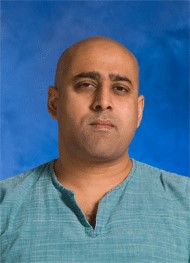Abstract: Ionic solids are important for electronic and energy storage/conversion devices. Examples include ferroelectrics and solid oxides. Defects in these materials play a central role in enabling their properties: for example, the electromechanics of ferroelectrics occurs by the nucleation and growth of domain wall defects, and solid oxide ionic conduction is through the motion of point defects. I will talk about our efforts to develop multiscale atomistic methods to understand the structure of defects in these materials. The central challenge is the long-range nature of the electrostatic interactions coupled with the nonlinearity of the short-range interactions.
Biographical Sketch: Kaushik Dayal is Professor of Engineering at Carnegie Mellon University. He received his B.Tech. at the Indian Institute of Technology Madras and his M.S. and Ph.D. in Mechanical Engineering at Caltech. His research interests are in the area of theoretical and computational multiscale methods applied to functional materials and electromagnetic effects. His research has been recognized by young investigator awards from ARO, AFOSR and NSF, the Eshelby and Leonardo da Vinci medals, and the Carnegie Institute Early Career Fellowship. He has held visiting appointments at the University of Bath, University of Bonn, National Energy Technology Laboratory and Air Force Research Laboratory.
